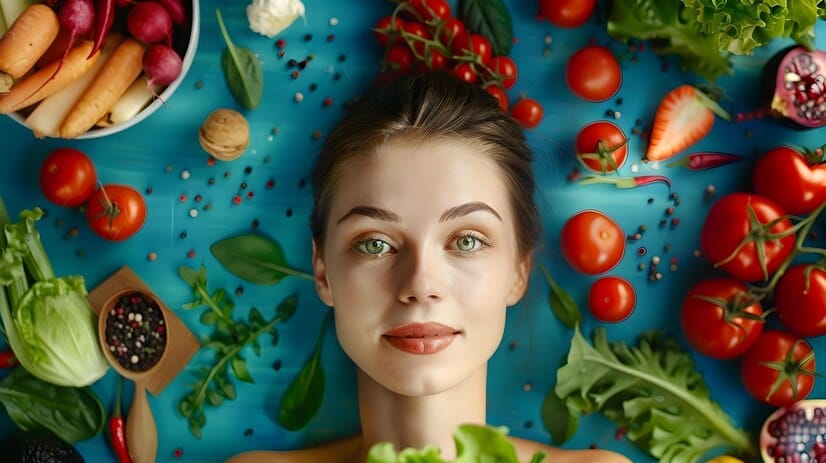We all dream of having radiant, glowing skin, but did you know that what you eat plays a significant role in achieving this? Nutrition isn’t just about maintaining a healthy weight or boosting your energy levels; it’s also crucial for the health and appearance of your skin. This article will dive into the best nutrition and diet tips to help you achieve and maintain healthy skin. From the importance of hydration to the power of antioxidants, we’ll cover everything you need to know to nourish your skin from the inside out.
The Connection Between Diet and Skin Health

How Diet Affects Skin
Your skin is a reflection of your overall health. A poor diet can lead to dull, dry, or acne-prone skin, while a balanced diet can give you a healthy, glowing complexion. Everything you eat affects your body, and your skin is no exception. Nutrients from food fuel your skin cells, support collagen production, and combat damage from environmental factors.
Key Nutrients for Healthy Skin
Several nutrients are essential for maintaining healthy skin, including vitamins, minerals, antioxidants, and fatty acids. These nutrients work together to keep your skin hydrated, firm, and free from damage. Let’s explore these in more detail.
Hydration: The Foundation of Healthy Skin

Importance of Water
Water is the simplest yet most critical component for healthy skin. Staying hydrated helps maintain your skin’s elasticity and prevents dryness. Dehydrated skin can appear flaky, dull, and more prone to wrinkles.
Tips for Staying Hydrated
- Drink at least eight glasses of water a day.
- Include water-rich foods like cucumbers, watermelon, and oranges in your diet.
- Limit caffeine and alcohol, as they can dehydrate your skin.
Antioxidants: The Skin’s Best Friend

What are antioxidants?
Antioxidants are compounds that protect your skin from damage caused by free radicals. Free radicals are unstable molecules that can damage skin cells, leading to premature aging and other skin issues.
The Best Sources of Antioxidants
- Berries: Blueberries, strawberries, and raspberries are packed with antioxidants.
- Nuts and Seeds: Almonds, sunflower seeds, and flaxseeds are excellent choices.
- Dark Chocolate: Look for dark chocolate with at least 70% cocoa.
Omega-3 Fatty Acids for Supple Skin

Benefits of Omega-3s
Omega-3 fatty acids help keep your skin supple and moisturized. They have anti-inflammatory properties that can reduce redness and acne.
Food Sources of Omega-3s
- Fish: Salmon, mackerel, and sardines are rich in omega-3s.
- Plant Sources: Chia seeds, flaxseeds, and walnuts are great plant-based options.
Vitamin C: The Skin Brightener

The Role of Vitamin C in Skin Health
Vitamin C is essential for collagen production, which keeps your skin firm and elastic. It also has antioxidant properties that protect your skin from damage and can help brighten your complexion.
Foods rich in vitamin C
- Citrus Fruits: Oranges, lemons, and grapefruits.
- Vegetables: bell peppers, broccoli, and Brussels sprouts.
Vitamin E: The Skin Protector
Benefits of Vitamin E
Vitamin E is a powerful antioxidant that helps protect your skin from damage caused by UV rays and pollution. It also has moisturizing properties that keep your skin soft and smooth.
Top Vitamin E-Rich Foods
- Nuts and Seeds: almonds, sunflower seeds, and hazelnuts.
- Green leafy vegetables: spinach, kale, and Swiss chard.
Zinc: The Skin Healer
How Zinc Supports Skin Health
Zinc is crucial for skin repair and regeneration. It helps heal wounds and can reduce the occurrence of acne by regulating oil production.
Zinc-Rich Foods
- Meat: beef, pork, and lamb.
- Legumes: chickpeas, lentils, and beans.
Collagen: The Skin’s Structural Protein

Importance of Collagen
Collagen is the most abundant protein in your skin, providing structure and strength. As we age, collagen production decreases, leading to wrinkles and sagging skin.
Boosting Collagen Production Naturally
- Bone broth is rich in collagen and amino acids.
- Vitamin C supports collagen synthesis, so pair it with collagen-rich foods.
Probiotics for Skin Health

Gut-Skin Connection
A healthy gut is often reflected in your skin. Probiotics support gut health, which in turn can improve skin conditions like acne, eczema, and psoriasis.
Probiotic-Rich Foods
- Yogurt: Look for live and active cultures.
- Fermented foods: sauerkraut, kimchi, and kefir.
Avoiding Skin-Damaging Foods

Foods to Limit or Avoid
Certain foods can trigger inflammation and skin issues. It’s best to limit or avoid:
- Sugary foods can lead to breakouts and dull skin.
- Processed foods often contain unhealthy fats and chemicals that can harm your skin.
- Dairy: Some people find that dairy products can worsen acne.
Effects of Sugar and Processed Foods
High sugar intake can cause glycation, a process that damages collagen and elastin, leading to premature aging. Processed foods often contain trans fats and artificial ingredients that can cause inflammation and breakouts.
Creating a Skin-Healthy Meal Plan

A Sample Meal Plan for Healthy Skin
- Breakfast: Greek yogurt with berries and a drizzle of honey.
- Lunch: Grilled salmon salad with mixed greens, avocado, and a lemon vinaigrette.
- Dinner: Quinoa bowl with roasted vegetables, chickpeas, and tahini dressing.
- Snacks: almonds, carrot sticks with hummus, and dark chocolate.
Tips for meal planning
- Incorporate Variety: Include a wide range of fruits, vegetables, and lean proteins.
- Plan Ahead: Prepare meals in advance to ensure you stick to healthy eating.
- Stay Balanced: Ensure each meal contains a mix of proteins, healthy fats, and carbohydrates.
Lifestyle Tips for Glowing Skin

The Importance of Sleep
Getting enough sleep is crucial for skin health. During sleep, your skin repairs itself, and a lack of sleep can lead to dark circles, puffiness, and dull skin.
Stress Management
Stress can negatively affect your skin, causing breakouts and other issues. Practice stress management techniques like yoga, meditation, and deep breathing exercises.
Supplements for Skin Health

When to Consider Supplements
While a balanced diet is the best way to get nutrients, supplements can help fill any gaps. Consider supplements if you have specific deficiencies or need an extra boost for your skin.
Popular skin-health supplements
- Collagen Peptides: Support skin structure and elasticity.
- Vitamin C and E are powerful antioxidants that protect and nourish the skin.
- Omega-3 fatty acids reduce inflammation and keep the skin hydrated.
Conclusion
Healthy, glowing skin starts from within. By focusing on a nutrient-rich diet, staying hydrated, and incorporating lifestyle changes, you can achieve and maintain beautiful skin. Remember, consistency is key, and small changes can make a big difference over time. Prioritize your skin health, and it will show in your radiant complexion.
FAQs
1. How long does it take to see improvements in skin health from diet changes?
It varies from person to person, but you may start to see improvements within a few weeks to a couple of months of making dietary changes.
2. Can supplements replace a healthy diet for skin health?
Supplements can help fill gaps in your diet, but they should not replace whole foods. A balanced diet provides a wide range of nutrients that supplements alone cannot.
3. Are there any specific foods that can cause skin breakouts?
Yes, foods high in sugar, processed foods, and sometimes dairy can contribute to breakouts for some people.
4. How does stress affect skin health?
Stress can trigger inflammation and breakouts. It can also disrupt sleep, leading to dull and tired-looking skin.
5. What are some quick dietary changes I can make for healthier skin?
Increase your water intake, add more fruits and vegetables to your meals, and reduce your consumption of sugary and processed foods.







